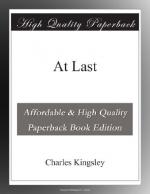No one saw this more clearly than did she whose fate trembled upon the next words she should utter. With all her hardihood, she hesitated to reply. Luxury, wealth, and station were on one side; degradation and poverty on the other. The solitary hope of reinstatement in the affection, if not the esteem, of him she loved truly as it was in her to love anything beside herself, was arrayed against the certainty of alienation and the tearful odds of ignominious banishment.
Her answer, under the presure of the warring emotions, was a semitone lower, and less distinctly enunciated than those that had gone before it.
“The denouement you propose for your romance is impracticable. Julius Lennox died before the date of the second marriage.”
Herbert drew himself to a sitting posture by clutching the back of the lounge. His red eyes and tumbled hair made him look more like a mad than a sick man.
“In the name of Heaven,” he demanded hoarsely, “have we not had enough lies, every one of which has been a blunder, and a fatal one? I told you, years ago, that the scene of this evening was a mere question of time; that, without a miracle, an edifice founded upon iniquity and cemented by falsehood must crush you before you could lay the top-stone. You would not be warned—you held on your way without hesitation or compunction, and now you would add to sin fatuity. Do you suppose that after what your husband has learned of your untruthfulness he will accept your assertion on any subject without inquiry? And, how many in your own family and out of it—although these may not know you by the name you now bear—are cognizant of the fact that Julius Lennox was alive for almost fifteen months after you became Mrs. Aylett?”
Mabel’s arm was about his neck, her hand upon his mouth.
“No more! no more! if you love me!” she whispered in an agony. “Should he guess all, he would murder her!”
“You are prepared to certify that he is dead now, are you, Mr. Dorrance?” queried Winston, suspicious of this by-play.
“I am!” sulkily.
“It is a pity!” was the ambiguous rejoinder.
Something clicked upon the hearth. It was the fragments of the toy stiletto, broken by an uncontrollable twitch of the small fingers that held it.
Then Mrs. Aylett arose, pale as a ghost, but unquailing in eye or mien.
“May I know your lordship’s pleasure respecting your cast-off minion?”
“In the morning, yes!” glancing up disdainfully. “Meantime, let me wish you ‘good-night’ and happy dreams.”
CHAPTER XX.
Indian summer.




